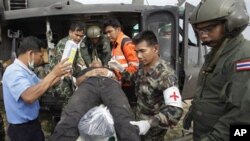Cambodia and Thailand moved closer to ending the fighting on their border with reports of a cease-fire agreement. Indonesian officials have worked to mediate in the dispute, which has left at least 15 people dead and forced thousands on both sides of the border to flee their homes.
After seven days of trading artillery fire, Cambodian officials said military commanders in the field had reached a cease-fire agreement.
Lieutenant General Chhum Socheat, a spokesman for the Cambodian Ministry of Defense, said Thursday that the agreement includes several elements, among them - allowing villagers along the border to return to their homes and reopening border crossings.
The general says the ceasefire has started, and that the agreement includes having soldiers on both sides remain on stand-by on their bases. In addition, he says, it aims to encourage field commanders to build a relationship that helps them communicate if problems come up.
But in Bangkok, Thai Army spokesman Colonel Sansern Kaewkamnerd says any agreement made by field commanders must also be agreed to at the highest levels of each government before it is official.
He says there has been no official announcement yet but that all Thai troops are currently within Thailand's sovereign territory.
The two neighbors have fought sporadically for two years over their poorly marked border. Both sides blame the other for starting the clashes this month.
Indonesian Foreign Minister Marty Natalegawa, in his role as head of the Association of Southeast Asian Nations, negotiated a ceasefire between the two neighbors in February, the last time the two sides fought. After meeting Thursday with Thai Foreign Minister Kasit Piromya, Natalegawa says trust has broken down on both sides.
"Basically the two sides must be saved from themselves, because we are now in this cycle of one says this, the other says that. Mutual recrimination and mutual accusation. Precisely the kind of a vicious circle that we have been trying to reverse," Natalegawa said.
He says news of the cease-fire, if true, is encouraging and that both sides must realize the only way to resolve this conflict is through diplomacy.
"We need to rebuild trust, rebuild confidence," Natalegawa explained. "But the simple question is, ‘What is the alternative? How far are they willing to go? How many more days of conflict? How many more people to be killed, to lose their lives?"
The last cease-fire called for Indonesian observers along the border but the Thai military rejected that idea. Natalegawa says Thailand must allow observers to ensure peace.
The conflict is the worst among ASEAN members in decades. The two countries have long disputed parts of their border, which is poorly marked, and sections of it have been littered with land mines since the Indochina war in the 1960s.
Tensions rose in 2008 after Cambodia received United Nations World Heritage status for an ancient Hindu temple just on its side of the border. Thailand and Cambodia dispute control over some of the land around that temple and nationalists on both sides have urged their governments to take tough action against the other. It is not clear, however, what caused fighting to break out earlier this month.
Cambodia, Thai Commanders Reach Cease-Fire Agreement
- Brian Padden




